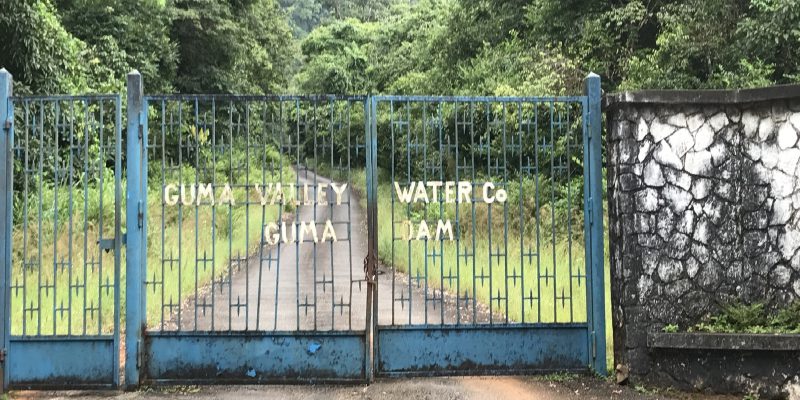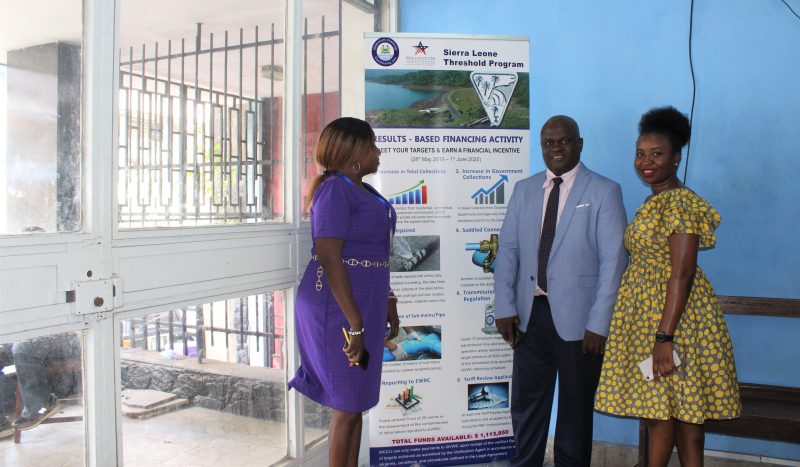
MCC
The Guma Valley Water Company is the main water supplier for the people of Freetown, Sierra Leone. Results-Based Financing tools in MCC’s Sierra Leone Threshold Program helped the utility meet the demands of the capital’s growing population.
Public utilities that can adequately deliver water and electricity are critical for sustained economic growth. Donors have supported utility reform and improved service delivery for decades but have often failed to deliver results with one-off projects lacking the strong buy-in and ownership from local partners required for significant and sustained improvements. Fortunately, this was not the case in Sierra Leone. MCC’s work in this threshold program demonstrated that RBF is a tool that can boost the impact of many of our investments. We tested the potential of RBF with a $5 million activity that yielded promising results and important lessons.
First, MCC partnered with three utility companies and their regulator in the water and energy sectors. The partners only received payments once pre-defined milestones were met and validated. This differs from more traditional approaches to development programs where donors typically pay for inputs like construction materials or consultants for technical assistance up front. With RBF, the aim was to motivate the utilities and the regulator to leverage other support provided through the threshold program to improve their planning, coordination, and operational and financial efficiency.
Tackling a ‘Vicious Circle of Underperformance’ Through Results-Based Financing
One of the participating utilities, the Guma Valley Water Company (GVWC), which manages most of Freetown’s water supply, has historically suffered from low collections rates, a loss of water supply due to leakages and poor infrastructure maintenance, and low employee morale. GVWC management felt that they were stuck in a ‘vicious circle of underperformance.’ The RBF activity provided GVWC the opportunity to define priority areas for improvement that aligned with their long-term goals and allowed them the flexibility to achieve results based on what they thought would work best. For example, GVWC wanted to improve collection rates, so they developed new policies and procedures and implemented them with this goal in mind. In the end, GVWC actually exceeded their target collection rate, increasing revenue collections by one third from the baseline. Other areas of significant improvement included repairs of critical leaks, submain installations, and stronger data management and reporting to the regulator.Perhaps most significant was the role the RBF approach played in facilitating strong ownership. Mr. Maada Kpenge, the GVWC Managing Director, reported that the activity gave them a chance to “step up” and demonstrate what they could do, while also leveraging support from MCC and our in-country partners. Many staff members had worked at GVWC for years and were complacent about negative customer feedback. The RBF activity motivated them to improve. According to Mr. Kpenge, the program provided him and his team with the necessary resources to reduce water wastage through more training and better equipment to manage leaks. Armed with the proper tools, GVWC staff were better able to perform their duties, and thus reported an increase in job satisfaction.
Another catalyst for change came out of the simple launching of an Employee of the Month program, demonstrating the value of RBF’s flexibility in allowing institutions to identify what initiatives might drive impact. Mr. Kpenge further stated that after a year of working towards the objectives of the RBF activity, the old practices have started making way for a new organizational culture—one that is more data-driven and responsive to customer needs. All of these changes represent an improvement in the water company’s core performance—building the foundation for them to be able to better provide clean, reliable water to the people of Freetown.

Eunice Tejan (left) and Maada Kpenge (center) of the Guma Valley Water Company (GVWC), along with Fatmata Barrie of Millennium Challenge Coordinating Unit (MCCU)—MCC’s local partner in Sierra Leone. According to Kpenge, the RBF activity under the Sierra Leone Threshold Program motivated GVWC to significantly improve its performance.
Lessons Learned for Future Results-Based Financing Projects
The RBF activity with the electricity utility — Electricity Distribution and Supply Authority (EDSA) — while less successful, still saw some improvements over time. Moreover, by rigorously measuring and verifying results and sharing these results with stakeholders, the Ministry of Energy was able to identify additional performance gaps at EDSA. This contributed to a culture of accountability and opened dialogue on how to improve these issues at EDSA moving forward.MCC’s experience with EDSA provides valuable lessons for future RBF projects. Based on interviews with stakeholders and an assessment of lessons learned, MCC has identified a few factors that could explain why EDSA did not perform as well on the RBF activity. These include funding size, management support, and readiness. EDSA turns over more than $80 million in energy generation deals annually, making MCC’s $1 million incentive program relatively small. The management team at EDSA was also focused on larger investments involving a management contractor which was supported by the World Bank, which limited their attention to the RBF activity. Additionally, changes to Sierra Leone’s energy sector strategy after the RBF program was designed point to questions of timing and readiness for EDSA’s participation in the program. In response to this experience, MCC has incorporated a readiness assessment into its RBF tools to future programs that will help to determine whether RBF is the appropriate tool to incentivize change.
Based on MCC’s experience in Sierra Leone, when effectively designed and implemented, RBF can drive impact by measuring and defining key performance indicators, creating financial incentives, and aligning incentives of service providers with the needs of citizens in our partner countries. It also pushes for accountability by making results transparent through reporting mechanisms. One of the main advantages of RBF lies in the fact that institutions have more autonomy to identify and make the changes necessary to achieve results. It also drives participating agencies to put the technical assistance and knowledge they have received into practice and demonstrate tangible progress to receive funding.
MCC is working to develop guidelines on how to do RBF in the future including tools for screening projects for opportunities where RBF could add value, due-diligence, design, and implementation.
Read additional details on the results and lessons of the RBF in Sierra Leone.

